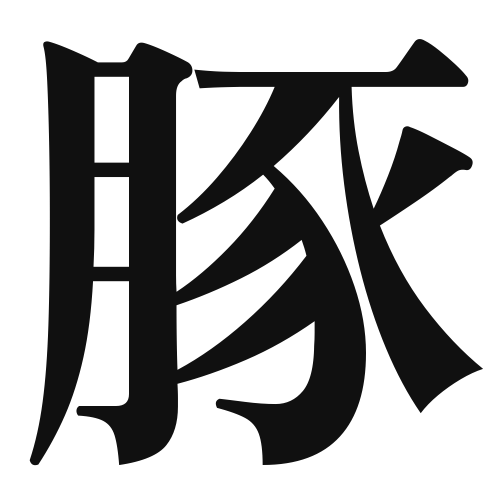1. Overview of Meaning
The kanji “豚” (buta) means “pig” or “swine” in English. It refers to the domesticated animal commonly raised for meat, and it is also used in various culinary contexts.
2. Formation and Radical
Formation of the Kanji: The kanji “豚” is a phonetic compound character, which means it combines both meaning and sound elements. The left part, “豕,” represents a pig, while the right part, “屯,” contributes to the pronunciation.
Radical: The radical for “豚” is “豕,” which is associated with animals, particularly those that are livestock.
3. Examples of Usage
Common Words and Phrases: Some common words that include “豚” are:
- 豚肉 (buta niku) – pork
- 豚カツ (tonkatsu) – pork cutlet
Example Sentences in Daily Conversation:
- 今晩は豚肉を使った料理を作ります。 (Konban wa buta niku o tsukatta ryouri o tsukurimasu.) – I will make a dish using pork tonight.
- 豚カツは私の好きな料理の一つです。 (Tonkatsu wa watashi no sukina ryouri no hitotsu desu.) – Pork cutlet is one of my favorite dishes.
4. Synonyms and Antonyms
Similar Kanji: A similar kanji is “猪” (ino), which also means “wild boar.” The difference lies in the domestication; “豚” refers to domesticated pigs, while “猪” refers to their wild counterparts.
Antonyms: There are no direct antonyms for “豚,” but one could consider “羊” (hitsuji), meaning “sheep,” as a contrasting livestock animal.
5. Cultural and Historical Background
Relation to Japanese Culture: In Japan, pigs are often associated with prosperity and good fortune. They are featured in various festivals and are considered a symbol of abundance.
Proverbs and Idioms: One common saying is “豚に真珠” (buta ni shinjyu), which translates to “pearls before swine,” meaning giving something valuable to someone who does not appreciate it.
